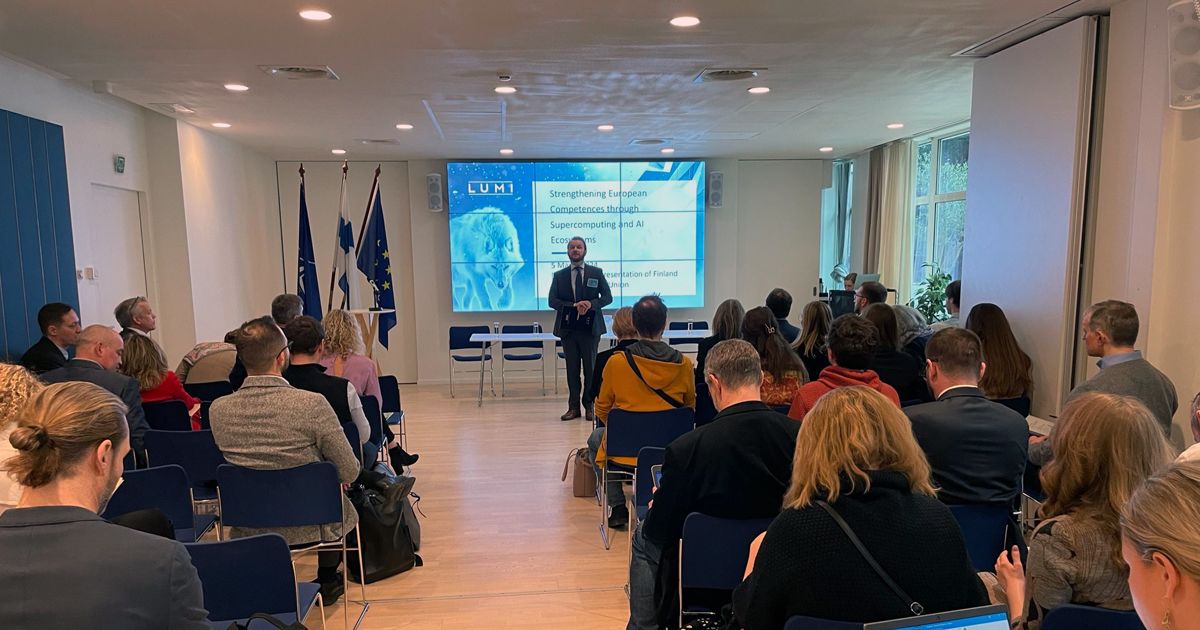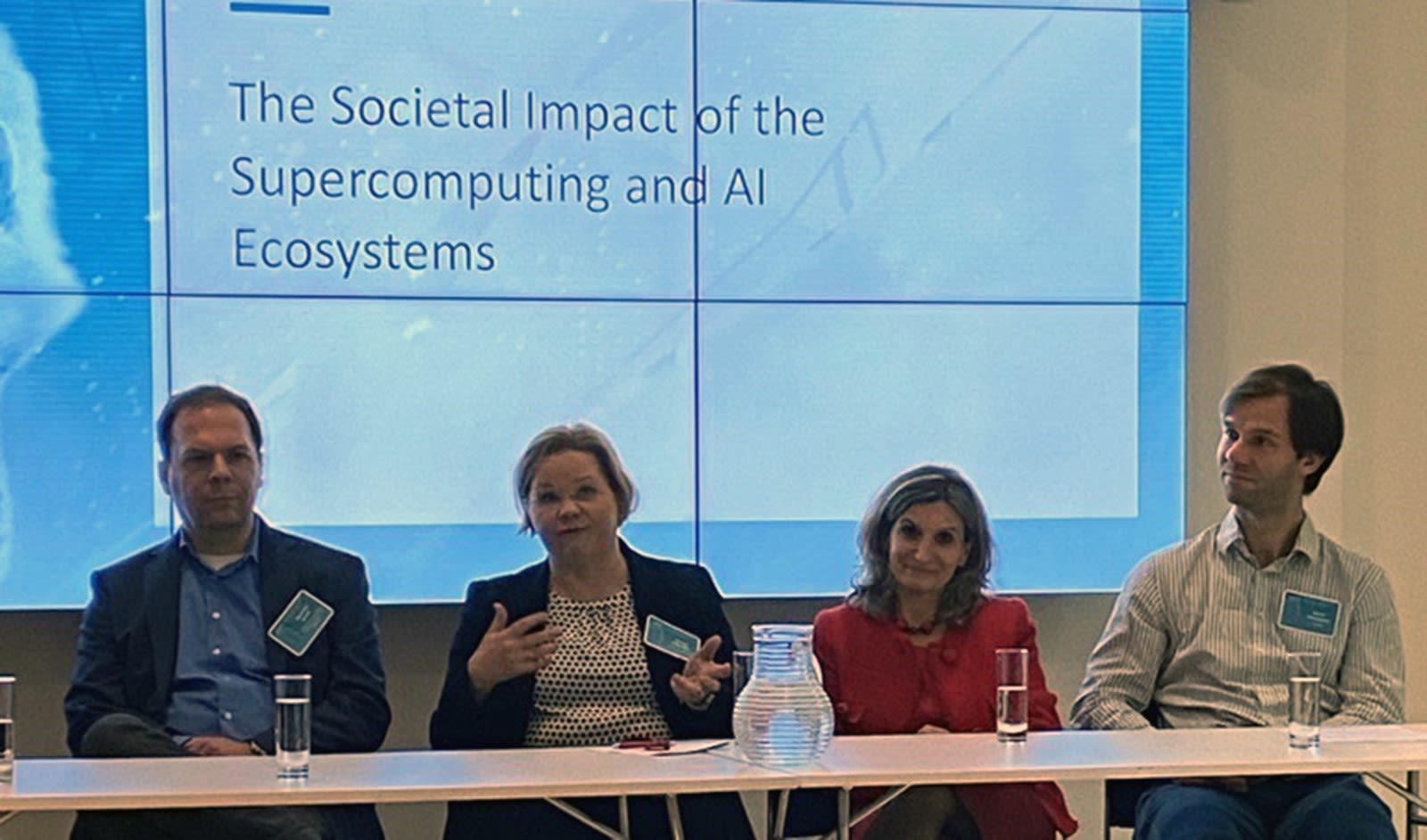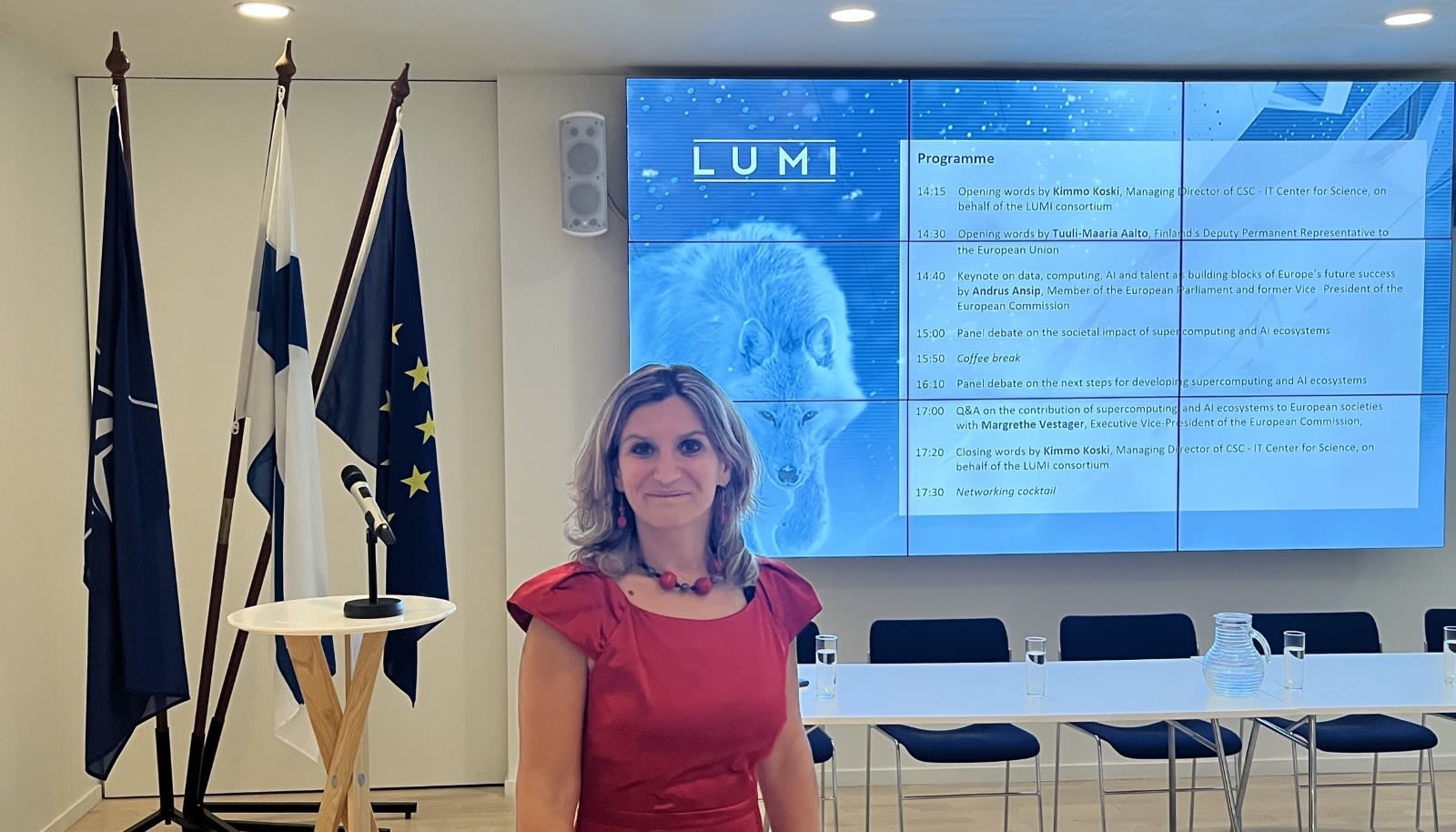The LUMI Consortium takes the hot topics of HPC and AI to the heart of Europe
Wide partnerships such as DestinE are key to developing AI and HPC ecosystems

Back to ECMWF - Destination Earth main page
The LUMI Consortium organised a high-profile event in Brussels on 5 March 2024 entitled “Strengthening European competences through supercomputing and AI ecosystems”. The event featured Margrethe Vestager, Executive Vice-President of the European Commission, Andrus Ansip, former Commission Vice-President and Commissioner for the Digital Single Market, CSC – IT Center for Science Managing Director Kimmo Koski and other leading voices from both the private and the public sector. Irina Sandu, Director of Destination Earth participated in one of the panels to highlight the importance of LUMI and supercomputing in general for Destination Earth
Europe needs broad, strong partnerships such as the Destination Earth initiative to create solid, sustainable high performance (HPC) and artificial intelligence (AI) ecosystems, was one of the key takeaways from the event organised by the LUMI Consortium at Finland’s Permanent Representation to the EU. The aim was to open a discussion about the fast -evolving transformations within the European HPC and AI ecosystems and the necessary collaboration at the pan-European level, as well as the next steps.
During her Q&A session closing the event Margrethe Vestager highlighted the role of the EuroHPC Joint Undertaking as an example that Europe is much more than regulations, and cited Destination Earth’s digital twins as the kind of achievements that help create much-needed excitement around high performance computing technology.

Left to right: Branislav Jansik, supercomputing Services Director, IT4Innovations National Supercomputing Center, Minna Palmroth, Professor in Computational Space Physics, Helsinki University, Irina Sandu, Director of DestinE at ECMWF and David Waroquiers, CEO and cofounder, Matgenix.
In a panel debating the societal impact of supercomputing and AI ecosystems, Irina Sandu praised the bold steps taken by Europe to adapt and respond to the escalating urgency of climate change and the unprecedented extreme events we are witnessing.
“Now, imagine creating a digital replica of our Earth to support adaptation efforts and implement the Green Deal. This is the aim of visionary initiative of the European Commission Destination Earth, implemented by ECMWF, ESA and EUMETSAT in a strategic partnership with EuroHPC Joint Undertaking (JU), and in close collaboration with over 100 institutions in Europe. LUMI lies at the heart of this endeavour aiming to revolutionize our understanding of the Earth system and help us better respond and adapt to the environmental challenges the world is facing.” said Irina Sandu.

"Destination Earth offers huge potential to society. The event organised by CSC was a fantastic opportunity for the initiative to meet partners and experts from around Europe, and showcase the links with EuroHPC, more particularly LUMI. Also on a personal level, it was a great pleasure to attend and bring to the table the fantastic work made by so many colleagues and partners through the creation of the first two high-priority digital twins."
The Director for DestinE at ECMWF detailed how LUMI is playing a crucial role in running Destination Earth’s digital twins, in particular the Climate Change Adaptation Digital Twin (Climate DT). She highlighted that LUMI will play an even more important role in the future. "In June the DestinE system will be opening to users and in the next years during the second phase of DestinE we will transition the digital twins' prototypes that we are piloting now at scale to operational systems,” she said. “CSC IT Center for Science will continue to lead the implementation of the Climate DT, that is operationalizing the capability to perform multi-decadal projections, providing accurate climate information for the next decades, and allowing to test scenarios of how global or local policies impact our planet’s climate.”
Irina Sandu also described how LUMI’s GPU capabilities will be key in providing the necessary infrastructure to train and build ambitious machine learning and AI-driven models within DestinE, by exploiting the Digital Twins data.
The panel also included academics and representatives of the private sector that detailed the contributions of HPC to develop accurate space weather simulators, the behaviour of materials, the perspectives of quantum computing or the issue of HPC energy consumption.
On a separate panel on the next steps for developing supercomputing and AI ecosystems, Cécile Huet, Head of Unit Robotics & AI Innovation and Excellence at the European Commission’s DG CNECT highlighted the creation of successful ecosystems needs building bridges between the AI, HPC and data communities and investing in skills.
Chair of EuroHPC JU Governing Board Rafal Duczmal reminded the benefits of keeping a global aspect in the European HPC development to ensure the availability of the best possible technologies and develop competences together with like-minded partners from all over the world.”
Host Kimmo Koski, Managing Director of CSC IT Center for Science, on behalf of the LUMI consortium explained that by pooling resources between the LUMI Consortium and EuroHPC JU was essential to manage to acquire one of the fastest and greenest supercomputers in the world, adding that it is “a powerful example of European cooperation.”
Irina Sandu concluded that events such as the one organised by the LUMI Consortium showcase how investments in digital technology, HPC and AI translate into societal benefits. “The excellent collaboration between DestinE, LUMI and EuroHPC JU is a perfect example of this.”
CSC IT Center for Science and the LUMI consortium are developing the Climate DT through a procurement issued by ECMWF, together with a wide consortium of excellence centres and institutions from across Europe.
A European consortium led by Météo-France is building the on-demand, regional component of the Weather Induced Extremes digital twin and ECMWF is creating the global component of the Extremes DT as well as the Digital Twin Engine the software environment behind DestinE’s digital twins.
Destination Earth is a European Union funded initiative launched in 2022, with the aim to build a digital replica of the Earth system by 2030. The initiative is being jointly implemented by three entrusted entities: the European Centre for Medium-Range Weather Forecasts (ECMWF) responsible for the creation of the first two ‘digital twins’ and the ‘Digital Twin Engine’, the European Space Agency (ESA) responsible for building the ‘Core Service Platform’, and the European Organisation for the Exploitation of Meteorological Satellites (EUMETSAT), responsible for the creation of the ‘Data Lake’.
We acknowledge the EuroHPC Joint Undertaking for awarding this project strategic access to the EuroHPC supercomputers LUMI, hosted by CSC (Finland) and the LUMI consortium, Marenostrum5, hosted by BSC (Spain) Leonardo, hosted by Cineca (Italy) and MeluXina, hosted by LuxProvide (Luxembourg) through a EuroHPC Special Access call.
More information about Destination Earth is on the Destination Earth website and the EU Commission website.
For more information about ECMWF’s role visit ecmwf.int/DestinE
For any questions related to the role of ECMWF in Destination Earth, please use the following email links:
Press and Communications enquiries
Main photo: courtesy LUMI/CSC-IT Center for Science
